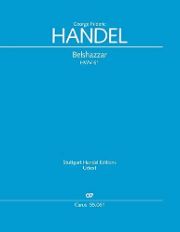Handel's sacred opera
The new Carus edition of "Belshazzar" combines three versions in one publication.

Who doesn't know the story from the Book of Daniel, in which King Belshazzar's "menetekel" announces the downfall of Babylon and thus the liberation of the Jewish people. On the one hand, this was ideal material for a sacred opera with detailed scene instructions and accompagnati, but on the other hand, biblical acts were forbidden on stage at the time. Handel therefore made a virtue of necessity and, four years after his Messiah with the Belshazzar one of his many oratorios, which ultimately emancipated England from the dominance of Italian opera that had prevailed until then.
The Carus publishing house cannot be praised highly enough for uniting all three performable versions of the oratorio in one edition for the first time with this exemplary Urtext edition: that of the first performance in 1745 as well as the revisions of 1751 and 1758, which consistently follow Handel's conducting score. A real recommendation, because it doesn't always have to be the Messiah be.
George Frideric Handel: Belshazzar HWV 61, versions 1745, 1751 and 1758, edited by Felix Loy; score: CV 55.061, € 129.00; piano reduction: CV 55.061/03, € 32.95; Carus, Stuttgart








